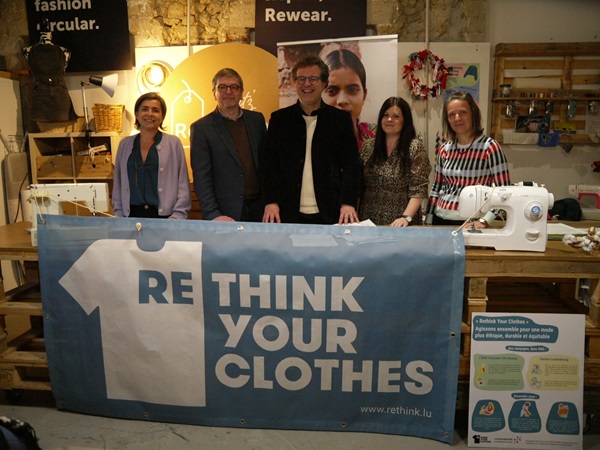 Credit: Fairtrade Lëtzebuerg/Caritas Luxembourg
Credit: Fairtrade Lëtzebuerg/Caritas Luxembourg
On Wednesday 24 April 2024, on the day of commemoration of the Rana Plaza tragedy, where thousands of textile industry workers lost their lives due to dangerous working conditions, the non-profit organisations Fairtrade Lëtzebuerg and Caritas Luxembourg presented an in-depth study on textile consumption habits in Luxembourg.
This presentation was organised as part of the “Rethink Your Clothes” campaign, and the study was done together with the polling institute ILRES. This study offers insight into trends and perspectives in a sector punctuated by human rights violations and overconsumption.
The results of the survey, based on the opinions of 944 people, revealed that two-thirds of the population (66%) consider it important to be informed about issues related to the textile sector.
Dressing habits and the relationship of Luxembourgers to their wardrobe
Today, 33% of the population is already aware and is looking more closely at the information indicated on the label. Half of those go further to check labels. Among young people aged sixteen to 24, 32% (37% online) say they buy clothes regularly (one to three times a month), this result highlights the problem of overconsumption in this demographic group.
Note that 72% of respondents indicate that they own at least one Slow Fashion item (e.g. second-hand, labelled clothing, swap, or rental), including 47% who indicate that they have labelled clothing (e.g. Fairtrade certified). According to the organisations, these results demonstrate a “solid basis” to further encourage responsible choice. Among those surveyed who own Slow Fashion clothing, the majority base their decision in alignment with their personal values, with 40% choosing out of conviction and 13% because it makes them proud.
Awareness of the challenges inherent in the fashion industry
Luxembourg residents are well aware of the two major challenges linked to the textile sector, namely “stopping overconsumption and extending the lifespan of clothing” (44%) and “guaranteeing better working conditions for employees, especially in textile manufacturing” (37%).
These two major issues have been at the heart of the “Rethink Your Clothes” campaign, since its launch in 2018, Fairtrade Lëtzebuerg highlighted. This initiative aims to raise public awareness of the impact of their clothing choices and to encourage more sustainable practices, while advocating for a reform of working conditions in the textile industry. The campaign therefore strives to mobilise individuals, businesses and policy makers to promote positive and lasting change in the fashion sector.
Panel expectations and outlook
Luxembourg's future in the fashion field relies on a transition towards more responsible clothing consumption. This development involves a fundamental change in the way residents buy, use and dispose of their clothing.
As for companies, the study found that two-thirds of respondents consider it important that promotional clothing is manufactured according to standards that respect human rights and the environment. 55% of the panel wanted more transparency from companies regarding working conditions in their supply chain, and 52% also asked that companies provide more information on labels and production methods.
79% of respondents thought that public institutions should promote a certified ethical, fair and sustainable textile sector.
To conclude, almost half of those surveyed would be encouraged to consume clothing more responsibly if there was a greater supply of clothing made from recycled materials or second-hand clothing. It’s also nearly one in two people who want a wider range of Fairtrade-certified clothing in stores. The current offer of certified, upcycled, second-hand and recycled clothing in Luxembourg remains very limited. Diversifying and increasing offers could play a significant role in building a more equitable, environmentally friendly and socially responsible future. A future based on social justice where cotton producers and textile industry workers would live with respect and dignity, Fairtrade Lëtzebuerg and Caritas Luxembourg emphasised.








